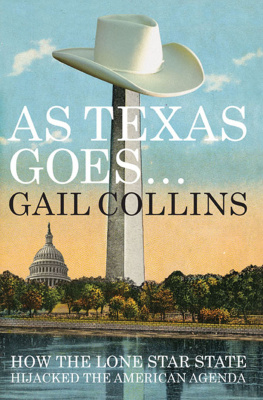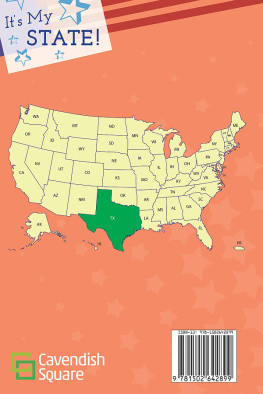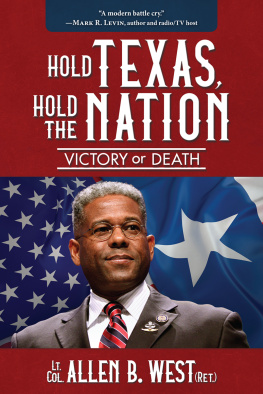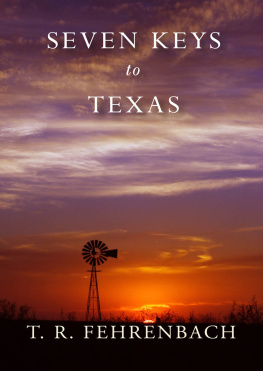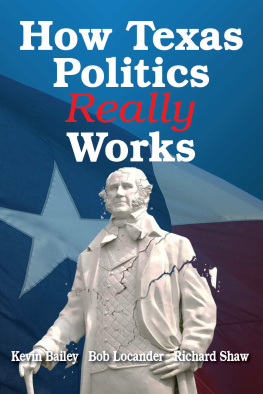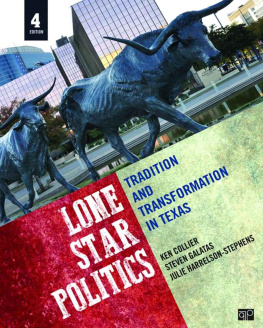ALSO BY GAIL COLLINS
When Everything Changed:
The Amazing Journey of American Women from 1960 to the Present
Americas Women:
Four Hundred Years of Dolls, Drudges, Helpmates, and Heroines
Scorpion Tongues: Gossip, Celebrity, and American Politics
The Millennium Book (with Dan Collins)
William Henry Harrison
PART TWO
HOW TEXAS CHANGED
THE NATION
Financial Deregulation
the Texas Angle
In a Gramm administration,
we will keep the cake
B ecoming a Republican worked very well for Phil Gramm, who not only won the 1983 special election to replace Democrat Phil Gramm in the House, but then moved on up to the Senate two years later. Waving his PhD in economics everywhere he went, Gramm got himself appointed to the Senate Budget Committee and became both a kind of economic guru to some conservatives and a recipient of mammoth campaign contributions from wealthy Texans. In February of 1995, armed with his huge bag of cash, he announced his candidacy for president of the United States.
Almost instantly, the Gramm luck ran out. As a presidential candidate, he was awful. Weve already taken note of the states talent for producing deeply unsuccessful White House contenders. (Outside of Lyndon Johnsons post-Kennedy-assassination victory in 1964, the only native-born Texan ever elected president was Dwight Eisenhower, who moved to Kansas when he was two.) But even by that standard, Gramms presidential run was pretty dismal. In the end he won all of ten delegates, at an average cost of $2.1 million apiece.
One of the many terrible things about candidate Gramm was his campaign stump speech, in which he told his audience, with a hungry world is not our cake but the recipe that we use to bake that cake. (Finally, we had a public figure even less sympathetic than Marie Antoinette, who at least never suggested that the state let the starving poor eat the recipes.)
That recipe is private property, free enterprise, and individual freedom, Gramm would continue. He is a tall, balding man with a rather long neck that he would stick forward as he peered at the crowd with his tiny little eyes. The general effect was of a turtle, wearing glasses and a really good suit.
In a Gramm administration, we will keep the cake and share the recipe! the candidate concluded triumphantly, often to deafening silence from his listeners. Nobody really got the part about the cake. The audiences may have been wondering whether the hungry nations had enough sugar and eggs and butter to follow the cookbook.
Gramm is important to this story because he represents what happened when the empty-places philosophy turned toward financial regulationbe it of savings and loan associations, commercial banks, energy markets, or all those inexplicable investments we have come to think of under the fits-all term of swaps. A former economics professor at Texas A & M, Gramm was in love with the vision of endless financial prairies where Americans could enjoy the blessings of a free market, roaming unfettered by federal regulation like happy mustangs on the range. and I realize that thats the very nerve center of American capitalism and I realize what capitalism has done for the working people of America, to me thats a holy place, he said in 2000 after a visit to New York.
The worst in the nation and
thats saying something
Gramm became a key player in setting the national agenda on financial deregulation. But this story started earlier, back in the 1970s, when Texas began applying the principles of the wide open economic spaces to its state-chartered savings and loan associations. The S & Lswhich we can never mention without pointing out that Jimmy Stewart ran one in Its a Wonderful Life had traditionally taken in deposits for a modest fixed rate and then lent out mortgage loans for slightly more. That hardly allowed for much elbow room, let alone free range-roaming. So the state decided to let them loan more money with fewer assets to back up the loans. It also permitted the S & Ls, which had formerly been all about home ownership, to lend money on commercial properties.
The results were spectacularprofits soaredand then spectacularly disastrous. Texas S & L ownerssome of them crooked, some of them just ineptloaned money at very high interest rates to people with no capacity, and sometimes no intention, to repay. They invested in stuff that was wildly speculative at best, and at worst, total theft. spent depositors money to send its president and his friends on a luxury tour of France under the theory that it was research for a high-end restaurant the thrift planned to open in Dallas. A collective of crooked Texas S & Ls shuffled their bad loans around, creating paper profits for the edification of the accountants.
Meanwhile, the Reagan administration was trying to figure out what to do with the federally chartered S & Ls, which were floundering in a world of double-digit inflation. They had already been effectively permitted to , and by 1981 were paying depositors an average of 11.53 percent. But they were only taking in 10.02 percent from all those mortgage loans. The Federal Home Loan Bank Board, which regulated the S & Ls, went looking for a new economic model that would allow them to get their income and outgo back in balance. At the time, state-chartered thrifts in Texas, which were less regulated than the federal S & Ls, were thriving. When it came to profits, Texas was at the top of the charts, said Bill Black, who worked for the Bank Board in the 1980s and had a ringside seat for the chaos that was to come.
Of course, Black added, that was because more of its savings and loans engaged in accounting fraud than anywhere else.
The Bank Board team wrote up a bill, which became the basis of the GarnSt. Germain Act, pretty much deregulating the S & Ls. If Black is right about the inspiration, they wanted to go where Texas had gonewithout, of course, the still-unnoticed fraud.
In fact, the feds went even further, in hopes that if they gave the S & Ls enough leeway, they could grow their way out of their huge losses. That created what Black called a race to the bottom when it came to control and oversight. First out of the box was California, which attempted to lure business back to the state by making its charters even more permissive than those of the feds. Texas upped the ante, deregulating its already pretty well deregulated thrifts even further.
Black was head of litigation at the Bank Board and then deputy director of the Federal Savings and Loan Insurance Corporation, the agency that was on the hook for compensating depositors when an S & L went under. He came to have a painfully detailed knowledge of the Texas S & L scene, with its cowboy-culture rules and skimpy oversight. Its state regulatory system was the worst in the nation and thats saying something, he concluded.
The most infamous of the Texas S & Ls was Vernon Savings and Loan, which the regulators fondly referred to as Vermin. It lives on in history for the theory that using S & L funds to hire a prostitute to entertain a bank regulator wasnt a bribe if the regulator was unable to rise to the occasion. ( in the game plan, and Dixon was eventually convicted of twenty-three counts of bank fraud.
Very Texas instincts
Athough Texas had swung hard for Reagan in the presidential elections, at the time the S & Ls were imploding, the states biggest power in Washington was a Democrat, House Speaker Jim Wright of Fort Worth, and Wright became a go-to guy for Texas thrift officials seeking protection from regulators who wanted to pull the plug on their doomed institutions. The Speaker had very Texas instinctsthese folks call themselves entrepreneurs who are beset by government, so they must be right, said Black.
When the Bank Board needed money to cover all the failing S & Ls, regulators believed Wright was holding up authorization while he demanded more leeway for home state businesses. (At one point, he that the aide in question was so eager to have a part in the creation of Reflections of a Public Man that he volunteered to do it on his own time, in the evenings and on weekends.
Next page
